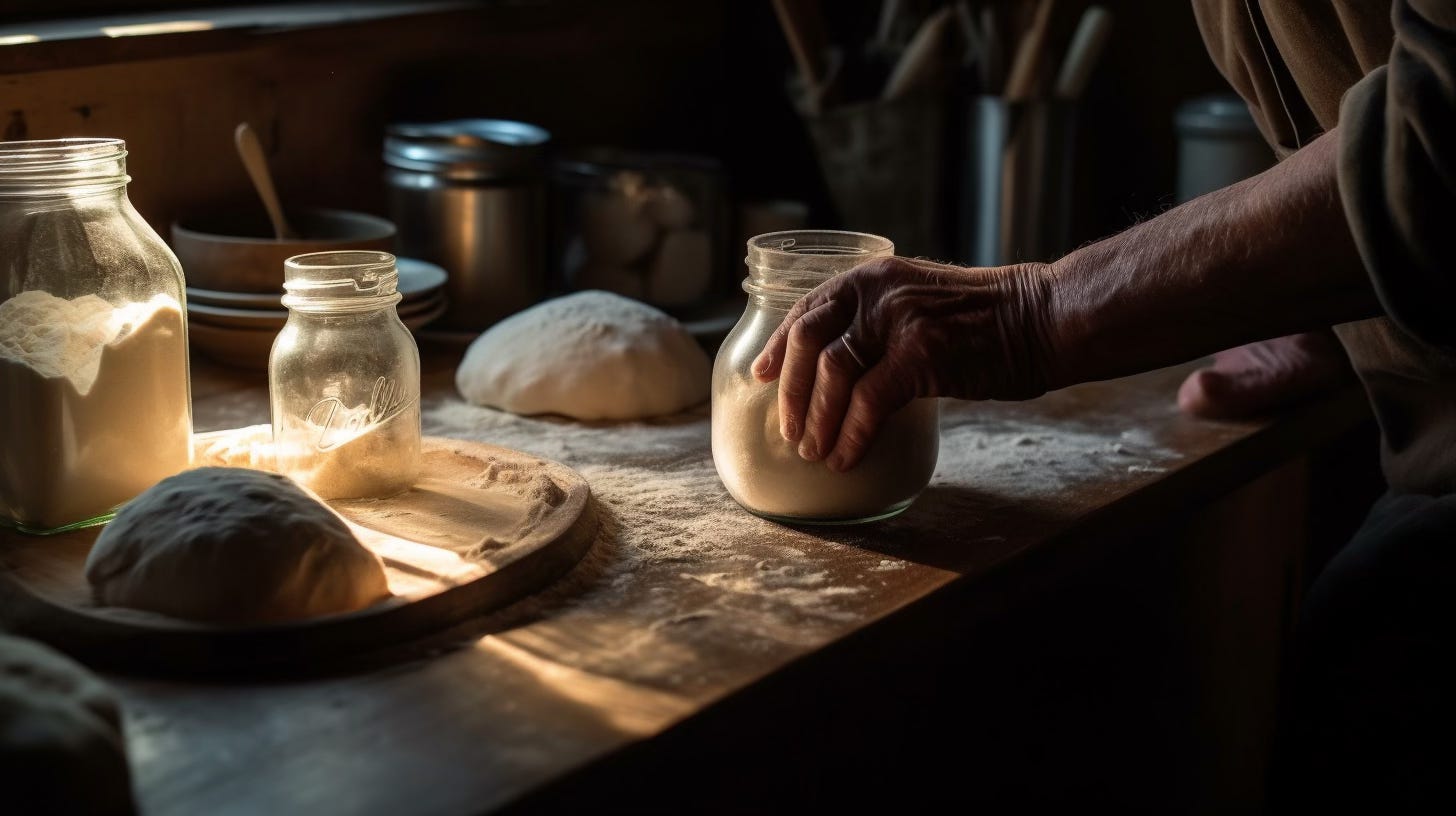🌱From Processed to Whole: Reclaiming Authenticity
What my kitchen taught me about the journey toward an undivided life
The English muffin sat on my countertop, and its perfectly round shape and uniform holes testified to the marvels of food engineering. Beside it lay the sourdough loaf I’d baked the previous day—lopsided, inconsistently holed, and unmistakably handmade. Both would nourish me, but only one bore the marks of my labor, the wild yeast captured from my garden and the time invested in its creation.
In truth, these years separated these events, but in the wee hours of the morning, as my wife slept peacefully next to me, I was my hyper-vigilant self. My mind’s eye merged them into one image to afflict me.
As I contemplated these two forms of bread, I realized I was looking at a metaphor for my life’s central struggle: the tension between the processed and the whole, between manufactured certainty and messy authenticity.
The Manufactured Self
For decades, I perfected a processed version of myself—meticulously engineered and quality-controlled. This processed identity had a consistent shelf life. It never surprised others with inconvenient feelings or needs. It performed reliably in professional settings, exceeding specifications for productivity and efficiency.
This manufactured self came with nutritional information that was easy to read and understand: Naval Academy graduate, submarine officer, successful executive, priest, and theologian. I carefully curated the ingredients list to include only the impressive achievements while omitting the chemical preservatives of fear, the artificial colors of conformity, and the excess sodium of resentment building beneath the surface.
My Duke classmates during pastoral clinical education noted the discrepancy during our debriefs, which are known as “verbatims,” but I wasn’t ready to hear their insights.
My workaholism wasn’t just a habit—it was the primary processing technique that transformed the complicated mess of my authentic self into a product others would reliably approve of. Just as processed food promises consistency and convenience at the cost of nutritional vitality, my processed self offered predictability and achievement at the expense of genuine presence.
The Garden’s Invitation
The first crack in this carefully constructed identity came unexpectedly through the soil.
Hands deep in the garden bed, I encountered a network of mycorrhizal fungi connecting my tomato plants—invisible threads of relationship that made individual flourishing possible. I suddenly recognized a discomforting parallel to my own life: I had severed many of these invisible connections in service to personal productivity.
My garden refused to conform to my executive timetables—seeds germinated according to their wisdom, not my project plans. Pollinators arrived unscheduled. Diseases appeared despite my prevention strategies. I could facilitate growth, but I couldn’t control it.
This realization was simultaneously frustrating and liberating. The garden taught me life operates through relationships and interindependence, not isolated self-sufficiency. The whole ecosystem functioned not through control but through connection.
Reclaiming Wholeness
My journey toward reclaiming authenticity began with small steps—like learning to make bread from scratch. There was something profoundly countercultural about accepting the unpredictable nature of wild yeast, the variations in each loaf, and the occasional failures.
As a young economics major and in my inculturation as an Anglo-Protestant male in the South, I’d embraced the teaching that adulthood was about constructing a life at the end of which I would have achieved such productivity that God and the world would, at last, declare me worthy. My workaholism wasn’t just a habit—it was a theological position, a misguided liturgy of worthiness through productivity.
But in the garden, kitchen, and recovery, I’m learning a different truth: worthiness is about being, not doing. It’s an action, yes, but an action that is relational—being in action that always drives toward the reunion of the separated, which is love. It’s about reconnecting with God, with others, with creation, and with myself—giving up my well-curated personas.
This revelation has transformed my understanding of work and my entire approach to life. In theological terms, I was learning what relational receptivity truly meant—an openness to encountering others and being encountered without immediately trying to control the interaction.
The shift from processed to whole hasn’t been a straight line. I still reach for the certainty of my old patterns, particularly when stressed or afraid. But I’ve come to see that authenticity—like good bread—requires patience, presence, and a willingness to work with rather than against the natural processes of human relationships. It means trusting that my worth isn’t produced at the end of life through accumulated achievements but is discovered in the midst of life through meaningful connection.
Discerning the Artificial
One of the most valuable skills I’ve developed is recognizing artificial ingredients in food and relationships. Just as I’ve learned to scan ingredient lists for hidden sugars and preservatives, I’ve become more attentive to how I substitute performance for presence, productivity for connection, and certainty for faith.
This discernment extends to my theological understanding as well. I’ve recognized how tribal epistemology functions like food processing—creating artificial certainty by removing complexity and nuance. Just as processed food promises satisfaction but creates deeper hunger, processed theology offers certainty while creating spiritual malnutrition.
The alternative isn’t chaos—it’s the wholeness that honors complexity. Just as whole foods contain the full spectrum of nutrients in their natural relationships, whole theology maintains the tension of mystery and knowledge, individual and community, freedom and responsibility.
The Unprocessed Table
The most profound moments of my recovery have happened around a table with others. Breaking real bread—with family and friends has become a practice of authentic presence, a small but significant act of resistance against the culture of efficiency and performance that dominated my life for so long.
This table fellowship embodies what I’m slowly learning: that my worth isn’t derived from what I produce but from participation in the relationships that constitute abundant life. It’s about being in action that reunites me with God and all of creation, with the gifts that sustain us in holy fellowship.
When I place a homemade, homegrown meal at the center of our table, I’m not just serving food. I’m making astatement about what I value: the nourishment that comes through patient cultivation, the satisfaction of work done with my hands, and the recognition that proper sustenance happens in a relationship, not isolation.
Questions for the Journey
As I continue this journey from processed to whole, I find myself returning to these questions:
Where in my life am I still substituting productivity for participation in the reunion of the separated?
What relationships am I processing for convenience rather than cultivated for genuine connection?
How might my faith become less about achieving worthiness and more about receiving and extending the gift of holy fellowship?
I don’t have complete answers, but I’ve found that asking these questions is a step toward wholeness—an acknowledgment that the journey toward authenticity is not about achieving a perfect end product but embracing the messy, interconnected process of becoming more fully human.
The garden, the kitchen, and my recovery journey all teach me the same essential truth: that worthiness isn’t something I construct through achievement but something I discover through relationships, through being in action that reunites the separated.
From My Garden
This is part of my “Rooted & Reaching” series, which explores spiritual formation through the metaphors of gardening, health transformation, and recovery from workaholism.
This essay continues my reflection on reconsidering what truly matters at age 65, examining how we might cultivate lives of greater authenticity and presence.




